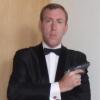Hi nanolark,
Thank you for being willing to open this discussion.
I fully embrace any genuine contributions to these fora. And the more new engaged members the better! You started with us by simultaneously posting many new thread topics based on own-ended questions. My original reaction to that approach was that your motivations came across as a little suspect and disingenuous. It didn't seem like you were contributing many ideas of your own but seemed more intent on farming the ideas of others - possibly to pass off as your own in an academic paper? If the users at CommanderBond.net are recognised and attributed for their contributons then that may be a bit different, but it was all very unclear.
I am more than happy to be corrected on those assumptions if they are wrong. I did acknowledge that you had started many interesting discussions, so thank you for that. I don't want to discourage your interest or your participation here. The opposite!
Dustin queried your familiarity with Fleming because your previous statements encouraged that view. I am still only part way through reading all his Bond books myself. If you have read some, then please by all means get amongst it and share your views!
So thank you for persisting. If you plan on continuing to hang around here and getting involved then that is fantastic. I look forward to seeing your contributions.
You are fortunate to have a lecturer who shares your interests and is willing to discuss Bond and Fleming. We are more than happy to have discussions with you too.
If you are here in sincerity, then please allow me to welcome you. ☺
Cheers
Edited by Emrayfo, 08 July 2015 - 01:32 PM.



